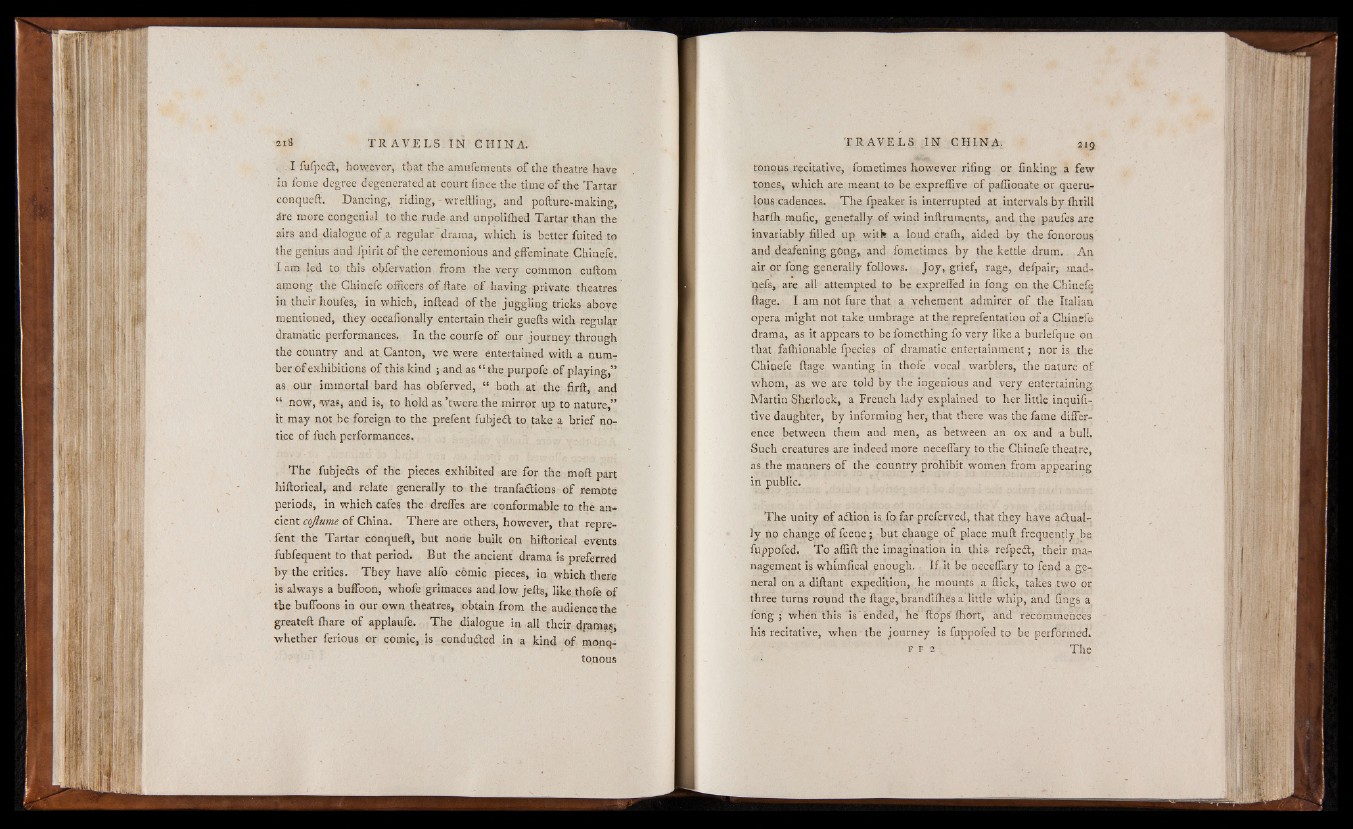
I fufped, however, that the amufements o f the theatre have
in fome degree degenerated at court fince the time o f the Tartar
conqueft. Dancing, riding, - wreftling, and pofture-making,
áre more congenial to the rude and unpoliihed Tartar than the
airs and dialogue o f a regular drama, which is better fuited to
the genius and fpirit o f the ceremonious and effeminate Chinefe,
I am led to this obfervation from the very common cuftom
among the Chinefe officers o f ftate o f having private theatres
in their houfes, in which, inftead o f the juggling tricks above
mentioned, they occafionally entertain their guefts with regular
dramatic performances. In the courfe o f our journey through
the country and at Canton, we were entertained with a number
o f exhibitions o f this kind ; and as “ the purpofe o f p laying,”
as our immortal bard has obferved, “ both at the firft, and
“ now, was, and is, to hold as ’twere the mirror up to nature,”
it may not be foreign to the prefent fubje£t to take a brief notice
o f fuch performances.
T he fubjeds o f the pieces exhibited are for the mod part
hiftorical, and relate generally to the tranfadions o f remote
periods, in which cafes the dreffes are conformable to the an*
cient cojlume o f China. There are others, however, that repre-
fent the Tartar conqueft, but none built on hiftorical events
fubfequent to that period. But the ancient drama is preferred
b y the critics. T h e y have alfo cómic pieces, in which there
is always a buffoon, whofe grimaces and low jefts, like thofe o f
the buffoons in our own theatres, obtain from the audience the
greateft lhare o f applaufe. The dialogue in all their dramas,
whether ferious or comic, is conducted in a kind o f monotonous
tonpus recitative, fometimes however riling or finking a few
tones, which are meant to be expreflive o f paifiona'te or querulous
cadences. The fpeaker is interrupted at intervals by fhtill
harih mufic, generally o f wind inftruments, and the paufes are
invariably filled up with a loud cralh, aided by the fonorous
and deafening gong, and fometimes by the kettle drum. An
air or fong generally follows. Joy, grief, rage, defpair, mad-
nefs, are all attempted to be expreffed in fong on the Chinefe
ftage. I am not fure that a vehement admirer o f the Italian
opera might not take, umbrage at the reprefentation o f a Chinefe
drama, as it appears to be fomething fo very like a burlefque on
that fafhionable fpecies o f dramatic entertainment; nor is the
Chinefe ftage wanting in thofe vocal warblers, the nature o f
whom, as. we are told by the ingenious and very entertaining
Martin Sherlock, a French lady explained to her little inquifi-
tive daughter, by informing her, that there was the fame difference
between them and men, as between an ox and a bull.
Such creatures are indeed more neceffary to the Chinefe theatre,
as the manners o f the country prohibit women from appearing
in public.
The unity o f a ¿lion is, fo far preferved, that they have actually
no change o f fcene; but change o f place muft frequently be
fuppofed. T o affift the imagination in this refpect, their management
is whimfical enough. I f it be neceffary to fend a general
on a diftant expedition, he mounts a ftick, takes two or
three turns round the ftage,brandiihfes a.little whip, and fings a
fong ; when this is'encfed, he Sops’ ihort, and recommences
his recitative, when the journey is fuppofed to be performed.
F F 4 . The